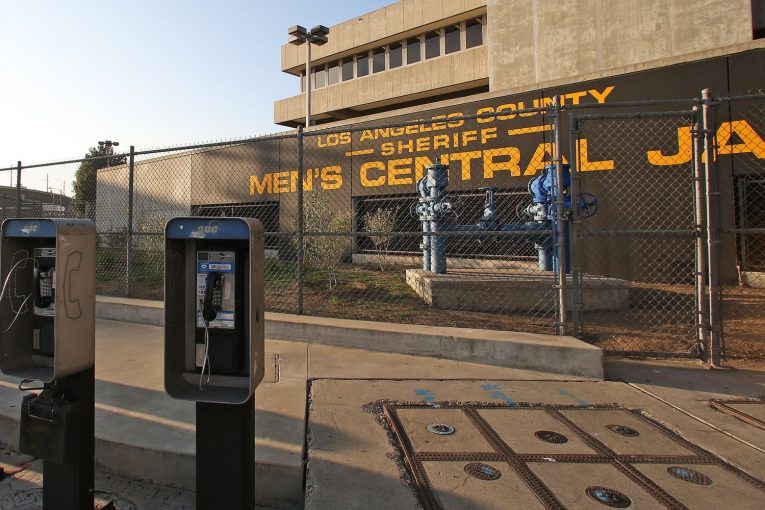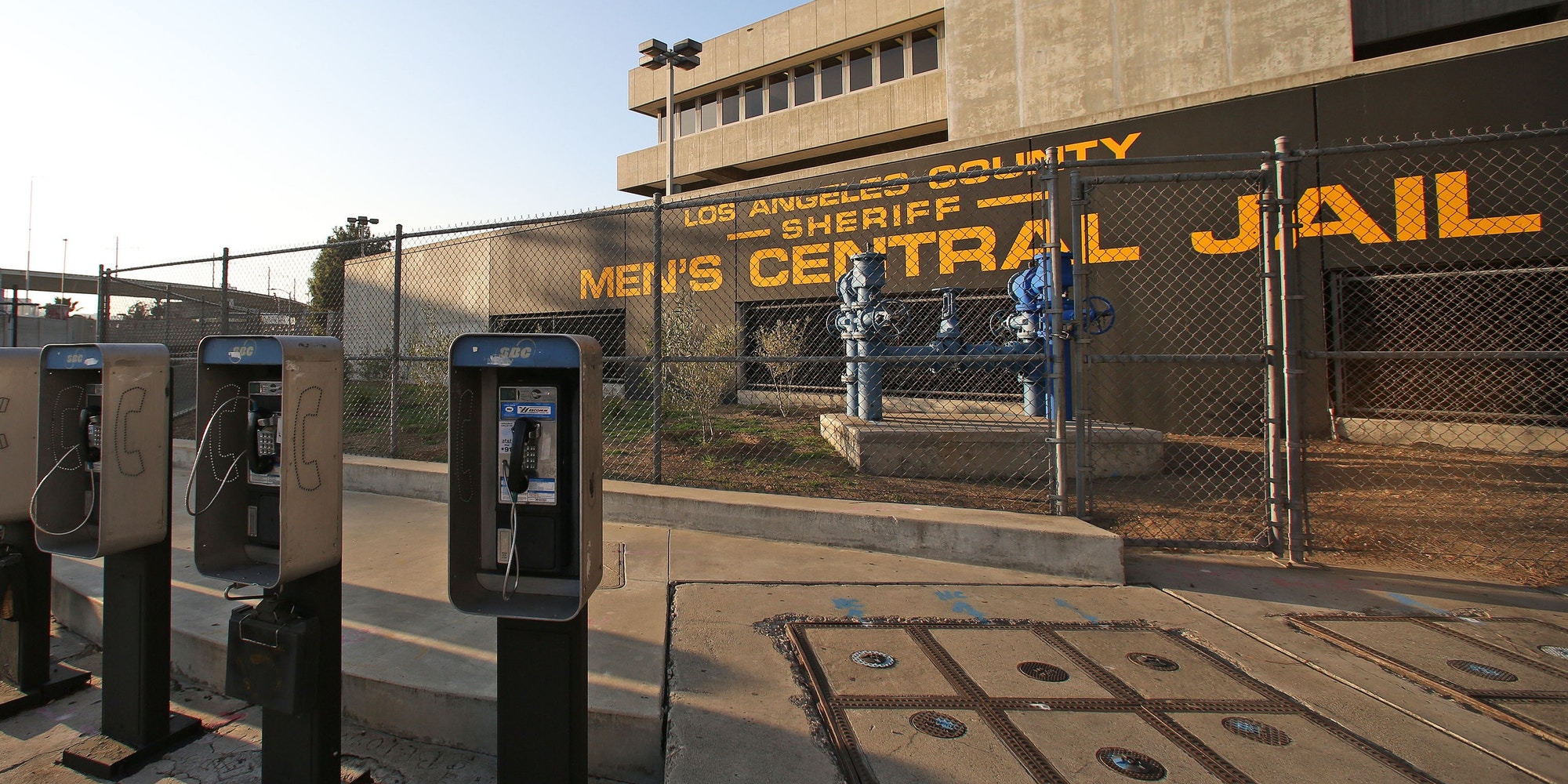

A loud screech of rubber announced the jail van’s quick departure from Uncle Sam’s jurisdiction. The thick-necked deputy in the passenger seat caught my eye in the rearview mirror. “So you’re some kind of karate guy, right?”
Seeing no advantage in answering, I remained quiet.
He snickered to his partner and did his best Bruce Lee impersonation. “Ooo-wah!”
It was an incredibly long half-mile drive.
IRC—the inmate reception center—comprises several rows of dismal holding cells where far too many incarcerated people are stuffed immediately following their arrest or, as in my case, their transfer from federal to state custody. Thick Neck escorted me to a dark 15-by-15-foot cell with bench seating for a dozen people. There were already more than 30 bedraggled men packed in like sardines. This was utterly inhumane. Perhaps that was the  point.
point.
“Careful with this one, fellas,” Thick Neck warned as he uncuffed me and nudged me inside. “Ooo-wah!” He chuckled and disappeared down the corridor.
The few men who were alert or sober enough to have heard the parting words eyed me warily. I grimaced as I surveyed the disgustingly filthy area. Old half-eaten single-serving peanut butter and jelly packets and moldy bread were strewn about the floor, the rotten, cloying stench competing with those of body odor and urine from the broken toilet. Using several packages of the inedible bread as a pillow, a man lay on his back under a dingy bench. His teeth were clenched, his legs twitching violently. What a lovely place for the poor guy to be kicking heroin.
Every inch of seating was occupied. People talked in low voices, slept, or mumbled to themselves, gazing unseeingly at the graffitied walls. After standing for four or five hours, I finally asked the room at large how long they’d been in here. Answers varied from six to 12 hours—until a man with crazed eyes and a wild bushy beard looked up.
“I’ve been here,” he said plaintively, “for 16 weeks.”
I stared at him a moment. “In processing. For 16 weeks.”
A few nearby residents rolled their eyes.
“Nobody believes me!” he shouted. “I shoulda only been here overnight. Drunk in public? Seriously?” A deputy walked by and the bearded man lunged at him through the bars. “Sir! It’s some kind of a mistake. I been in this hellhole for four months. Can—”
“Yeah, sure you have, Grizzly Adams,” the deputy said, walking by without slowing.
Eventually they called my name and told me to go to window 32, where a bored-looking woman gave me a wristband and instructions: Go to window 29. Where a morose clerk sent me to another window. And another. Sit on that bench. Next window. Go see medical.
A stooped, old, tired-looking doctor nodded a greeting at me and did a double-take at the name on my file. “Frandsen . . . I served in the Navy with a Frandsen.”
“Was he a captain?” I asked.
“Why yes he was! Had his own TV show, didn’t he?”
“Yep. Meet the Mayor. And he was a bad guy on The Rifleman. That’s my Grandpa Tom.”
“No kidding. Small world, eh? Okay, now say ‘ah.’”
With my examination complete, I was relegated to a bench at the far end of the hall, presumably my last stop before being classified and finally given a bed. It had been almost 24 hours since I’d begun processing. Afraid to touch any surface in any of the sticky cells I’d been in, I’d remained not only awake, but on my feet. I couldn’t wait to lie down.
“Frandsen,” said the deputy at the desk. “Let me see your wristband.” I showed him. He compared the name on his screen to the one on my band—which he then cut off. “Go to window 32.”
“I already—”
At window 32 the same bored-looking woman from yesterday handed me a new wristband. “Go to window 29.”
“I did all this yesterday,” I protested. “Remember?”
“You know how many people come here? Every day? Next!”
I repeated the same sadistic circuit—morose guy, window, window, bench, next window, medical with a different doctor, deputy at the end of the hall cut off my wristband again. It had now been 47 hours. No sleep. No toothbrush. No soap.
“Go to window 32.”
“Wait. I’ve already done—”
“Next!”
About 16 hours later I looked up through bleary eyes at the first doctor again.
“Say ‘ah.’”
“No, wait,” I said frantically. “This is the third time I’ve been in this office. I haven’t slept in three days. They just keep sending me around in circles. Please, look at the name. Remember? Captain Frandsen.”
Recognition flickered in his eyes. “Oh, right. Let me make a call.”
They put me back in the first holding cell from three days ago, only there were even more men stuffed inside this time. They must really think we are animals, I thought, slumping onto a bench with a groan. “I can’t believe,” I said to no one in particular, “they’ve been processing me for three days.”
A familiar crazed-eyed, bushy-bearded face popped up from his disgusting “bed” of bread packages on the mucky floor. He turned to me. “I told you!”
I gaped at him. It couldn’t be. “You . . . haven’t really been here for 16 weeks, have you?” I asked in alarm.
“Longer now,” he said. “I think I’m gettin’ peanut butter poisoning.”
Oh. My. Lord. What kind of Bermuda Triangle were we in? The following week, a local newspaper reported that the Los Angeles Sheriff’s Department had settled out of court in the low six figures for imprisoning a San Fernando Valley man for 17 weeks for a DUI that should have meant a 24-hour “dry-out.”
At long last, eyes drooping down to my jaw line, I was allowed to trudge, feet dragging down the hallway, to a cell in a module labeled 2400. My assigned spot was at the end of the row, so I was afforded a brief tour of things to come. The cells were designed for four people, but seven or sometimes eight men were compressed inside, the extra guys forced to sleep on the mouse-riddled floor. It was accepted that men would have to fight to keep their privilege of sleeping on a bunk.
As I was about to pass the fifth cell, I froze in terror. Five people had their backs pressed against the wall, with several of their faces as pale as ghosts. Writhing a few feet from the bars was a gruesome four-legged, four-armed creature slathered in blood: a wild-eyed man sat cross-legged with a lifeless, shirtless body lying across his lap like a demonic minstrel’s bloody guitar. Wielding a makeshift knife like a fountain pen, the man was nearly done carving “San Pedro” into the corpse’s back, the crimson penmanship terrifyingly neat.
I lurched away from the nightmare tableau, tripping over myself in my haste to escape to my assigned cell. Inside, I muttered unintelligible greetings to my new cellmates. Thankfully, a bunk was unoccupied, so I collapsed onto my tortilla-thick mat and dreamed only in red.
Benjamin Frandsen is an award-winning published author, poet, screenwriter, singer/songwriter, journalist, and the host of the Ben Free Podcast. Originally published by the Vera Institute of Justice.
